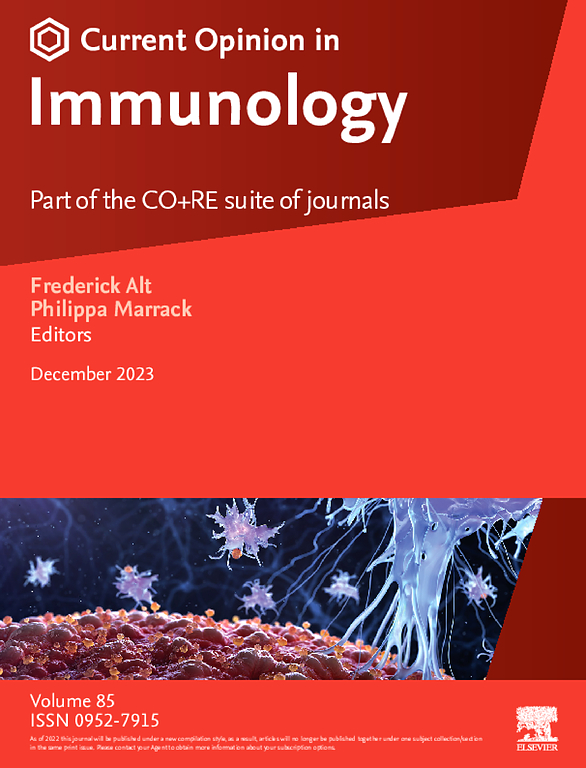Epigenetics: the link between environmental exposures and autoimmune diseases
IF 6.6
2区 医学
Q1 IMMUNOLOGY
引用次数: 0
Abstract
Autoimmune diseases (AIDs) comprise a highly heterogeneous group of disorders with significant morbidity, disability, and mortality. Growing scientific evidence has suggested the interactions between genetic and environmental factors robustly involving in the pathogenesis of AIDs. Epigenetics serves as a critical bridge linking between gene expression patterns and external environmental stimuli. Several research areas have emerged to investigate these epigenetic modifications, including DNA methylation, histone modifications, and microRNAs. On the other hand, epidemiological studies have well-established the marked relationship between the occurrence and development of AIDs and environmental exposures, especially chemical, physical, and biologic factors. However, the knowledge gap between the role of specific external agents in the development of AIDs and the impact of epigenetic signatures has not been filled. This review synthesizes recent findings AID-associated environmental factors, their role in the development of AIDs, and their interactions with genetics and influence on epigenetic modifications. We also discuss the tool for assessing causal relationships between environmental risks and clinical intervention trials to prevent disease progression. In all, precise understanding of the underlying mechanisms between epigenetics and environmental risk factors is crucial for timely prevention and treatment to improve AIDs outcomes.
表观遗传学:环境暴露与自身免疫性疾病之间的联系
自身免疫性疾病(艾滋病)包括一组高度异质性的疾病,具有显著的发病率、致残率和死亡率。越来越多的科学证据表明,遗传和环境因素之间的相互作用有力地参与了艾滋病的发病机制。表观遗传学是连接基因表达模式和外部环境刺激之间的重要桥梁。已经出现了几个研究领域来研究这些表观遗传修饰,包括DNA甲基化,组蛋白修饰和microrna。另一方面,流行病学研究已经确立了艾滋病的发生和发展与环境暴露之间的显著关系,特别是化学、物理和生物因素。然而,具体的外部因素在艾滋病发展中的作用和表观遗传特征的影响之间的知识差距尚未填补。本文综述了艾滋病相关环境因素及其在艾滋病发展中的作用、与遗传学的相互作用以及对表观遗传修饰的影响等方面的最新发现。我们还讨论了评估环境风险与预防疾病进展的临床干预试验之间因果关系的工具。总之,准确理解表观遗传学和环境风险因素之间的潜在机制对于及时预防和治疗艾滋病至关重要。
本文章由计算机程序翻译,如有差异,请以英文原文为准。
求助全文
约1分钟内获得全文
求助全文
来源期刊
CiteScore
13.30
自引率
1.40%
发文量
94
审稿时长
67 days
期刊介绍:
Current Opinion in Immunology aims to stimulate scientifically grounded, interdisciplinary, multi-scale debate and exchange of ideas. It contains polished, concise and timely reviews and opinions, with particular emphasis on those articles published in the past two years. In addition to describing recent trends, the authors are encouraged to give their subjective opinion of the topics discussed.
In Current Opinion in Immunology we help the reader by providing in a systematic manner: 1. The views of experts on current advances in their field in a clear and readable form. 2. Evaluations of the most interesting papers, annotated by experts, from the great wealth of original publications.
Current Opinion in Immunology will serve as an invaluable source of information for researchers, lecturers, teachers, professionals, policy makers and students.
Current Opinion in Immunology builds on Elsevier''s reputation for excellence in scientific publishing and long-standing commitment to communicating reproducible biomedical research targeted at improving human health. It is a companion to the new Gold Open Access journal Current Research in Immunology and is part of the Current Opinion and Research(CO+RE) suite of journals. All CO+RE journals leverage the Current Opinion legacy-of editorial excellence, high-impact, and global reach-to ensure they are a widely read resource that is integral to scientists'' workflow.

 求助内容:
求助内容: 应助结果提醒方式:
应助结果提醒方式:


